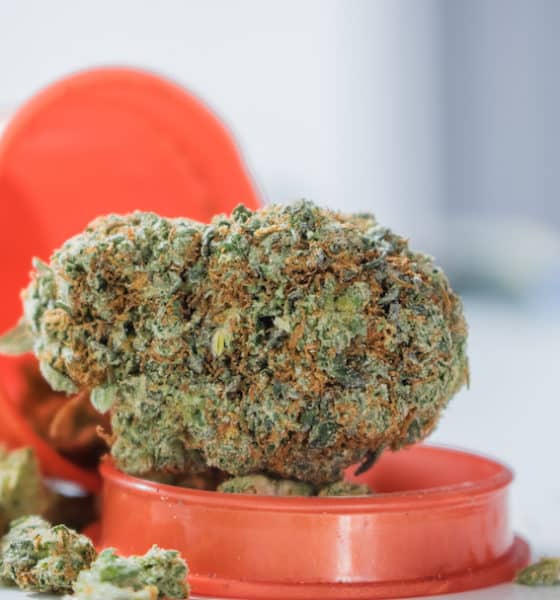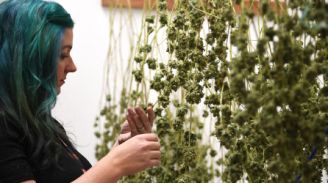With an eye on legalization in the Empire State, a new MedMen dispensary opens in New York City. New York’s newest dispensary, which opened its doors on 4/20, is located on Fifth Ave. Here’s an inside look at the luxurious dispensary that would make the likes of Don Draper proud.
Inside MedMen on Fifth Avenue
The 2,000 square foot flagship store is in good company on New York’s iconic retail street: Barney’s, Apple and Saks Fifth Avenue are mere blocks away. As MedMen CEO Adam Bierman told Business Insider, “It’s the prime retail shopping street in the world.”
The store’s design symbolizes Bierman’s anticipation for what’s next. “This store represents the future,” the CEO explained to a private party on Wednesday. Circular LED chandeliers, crisp walls and iPad displays line the store. Posters on the wall feature people with the subhead ‘Stoner’, crossed out.
MedMen dispensary opens in New York City with a sleek design, a prime location and an important mission: Make marijuana mainstream.
What This Dispensary Is Selling
Currently, MedMen is offering five strains in the form of vape pens, tinctures and capsules. Though California locations carry thousands of products, MedMen abides by New York laws, which are much more restrictive.
The iPad displays offer detailed descriptions of the five different categories: Wellness, Harmony, Awake, Calm and Sleep. They even recommend strains, based on what you’re looking to treat. The display also lists THC and CBDratios.
Need more information? MedMen has a whole staff of pharmacists. No matter what you’re hoping to treat, this dispensary will find the strain and delivery method that’s right for you.
Not Everyone Can Shop At MedMen (For Now)
A MedMen dispensary opens in New York, though most New Yorkers can’t legally buy weed. At least, not yet.
Though you’re more than welcome to explore the dispensary, MedMen only currently caters to medical marijuana users. Until recreational marijuana becomes legal in New York, shoppers will need to provide a medical marijuana card and a doctor’s note before purchasing.
This slims down the market. Out of about 20 million residents, only 33,000 New Yorkers hold medical marijuana cards. Senior vice president of MedMen Daniel Yi explains, “We’re positioning ourselves for what we will believe is going to happen in New York.”
If legalization passes later this year, MedMen, the third dispensary to open to New York City, will be poised to take over the luxury cannabis industry.
The Future of Legalization In New York
Earlier this month, Gubernatorial candidate and Sex and the City star Cynthia Nixon announced that she supports legalizing recreational marijuana.
On Twitter, Nixon explained her position. “There are a lot of good reasons for legalizing marijuana,” she said, but for me, it comes down to this: We have to stop putting people of color in jail for something that white people do with impunity.”
In light of newly released statistics showing racial disparities in New York marijuana arrests, constituents are taking note of Nixon’s critique of racial injustice. Support for marijuana legalization in New York is growing.
So much so that New York’s current governor, and Nixon’s opponent, Andrew Cuomo just changed his mind on cannabis. Just a day after Nixon came out in support of legalizing recreational marijuana, Cuomo reevaluated his position.
“The facts have changed,” explains the Governor, undermining his history of opposing legalization. Once, he even went so far as to call weed a “gateway drug.”
Final Hit: MedMen Dispensary Opens In New York City
MedMen’s arrival on Fifth Ave symbolizes that times are changing when it comes to smoking weed in the Big Apple.
As politicians and big business work towards legalization, the Empire State is poised to become the biggest new marijuana market in the country.
MedMen only has to bide its time.















